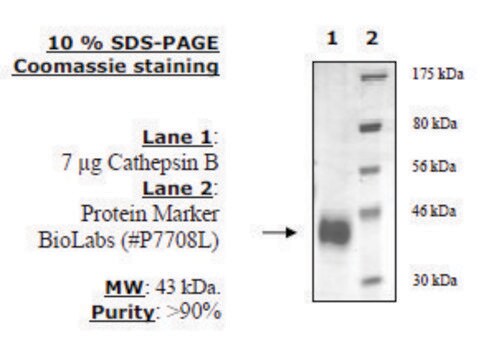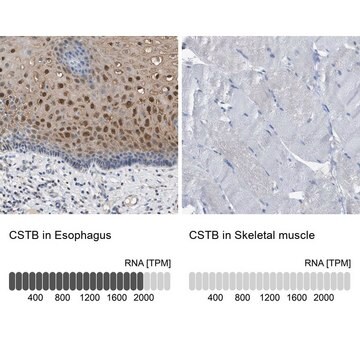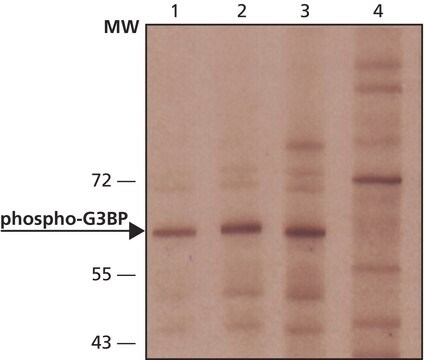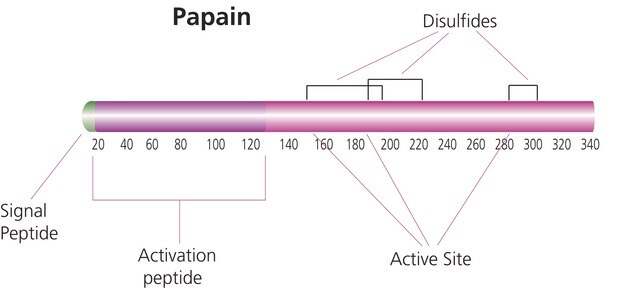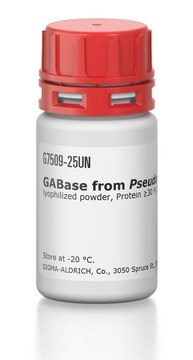C4249
Cystatin B human
recombinant, expressed in E. coli, solid, ≥95% (SDS-PAGE)
Synonym(e):
CPI-B, CST6, CSTB, EPM1, Liver Thiol Proteinase Inhibitor, PME, STFB, Stefin B
Anmeldenzur Ansicht organisationsspezifischer und vertraglich vereinbarter Preise
Alle Fotos(1)
About This Item
UNSPSC-Code:
12352202
NACRES:
NA.77
Empfohlene Produkte
Produktbezeichnung
Cystatin B human, recombinant, expressed in E. coli
Rekombinant
expressed in E. coli
Qualitätsniveau
Beschreibung
contains a N-terminal 7X His-tag
Assay
≥95% (SDS-PAGE)
Form
solid
Mol-Gew.
apparent mol wt ~13 kDa by SDS-PAGE (reducing)
NCBI-Hinterlegungsnummer
Lagertemp.
−20°C
Angaben zum Gen
human ... CSTB(1476)
Allgemeine Beschreibung
Cystatin B is a member of the type 1 (stefins) superfamily of cystatins. Cystatin B is encoded by the CSTB gene and functions as an intracellular thiol protease inhibitor regulating the activity of members of the papain family and cathepsins B, H, and L. Cystatin B may also protect cellular components from the effects of proteases that leak from lysosomes. Mutations in the CSTB gene are thought to be the primary defect in patients with Progressive Myoclonus Epilepsy (EPM1).
Anwendung
Suitable for use as a cysteine-protease inhibitor. Is tested for suitability as an inhibitor of the enzymatic activity of papain.
Biochem./physiol. Wirkung
Cystatin B was shown to interact with the protein RACK-1, β-spectrin and neurofilament light chain NF-L forming a unique multiprotein complex specifically in the cerebellum, confirming its function in the brain.
Rekonstituierung
Cystatin B should be reconstituted at 100 μg/mL in steile 25 mM Tris pH 7.5 and 100 mM NaCl. Reconstituted product should be stored in single-use aliquots at -70° C and should be stable for at least 3 months.
Lagerklassenschlüssel
11 - Combustible Solids
WGK
WGK 3
Flammpunkt (°F)
Not applicable
Flammpunkt (°C)
Not applicable
Hier finden Sie alle aktuellen Versionen:
Besitzen Sie dieses Produkt bereits?
In der Dokumentenbibliothek finden Sie die Dokumentation zu den Produkten, die Sie kürzlich erworben haben.
Rossella Di Giaimo et al.
Human molecular genetics, 11(23), 2941-2950 (2002-10-24)
Cystatin B is an anti-proteolytic polypeptide implicated in progressive myoclonus epilepsy (EPM1), a degenerative disease of the central nervous system. The knock-out mouse model of the disease shows apoptosis of the cerebellar granule cells. We have identified five recombinant proteins
Hana Dvořáková et al.
Frontiers in cellular and infection microbiology, 10, 66-66 (2020-03-17)
Schistosomula (the post-infective stages) of the neurotropic schistosome Trichobilharzia regenti possess multiple isoforms of cathepsin B1 peptidase (TrCB1.1-TrCB1.6) with involvement in nutrient digestion. The comparison of substrate preferences of TrCB1.1 and TrCB1.4 showed that TrCB1.4 had a very narrow substrate
Amanda Phuong Tran et al.
The Journal of neuroscience : the official journal of the Society for Neuroscience, 38(23), 5399-5414 (2018-05-16)
Severed axon tips reform growth cones following spinal cord injury that fail to regenerate, in part, because they become embedded within an inhibitory extracellular matrix. Chondroitin sulfate proteoglycans (CSPGs) are the major axon inhibitory matrix component that is increased within
Vincenzo Lionetti et al.
PloS one, 10(7), e0133810-e0133810 (2015-07-24)
Pectin is secreted in a highly methylesterified form and partially de-methylesterified in the cell wall by pectin methylesterases (PMEs). PME activity is expressed during plant growth, development and stress responses. PME activity is controlled at the post-transcriptional level by proteins
Unser Team von Wissenschaftlern verfügt über Erfahrung in allen Forschungsbereichen einschließlich Life Science, Materialwissenschaften, chemischer Synthese, Chromatographie, Analytik und vielen mehr..
Setzen Sie sich mit dem technischen Dienst in Verbindung.